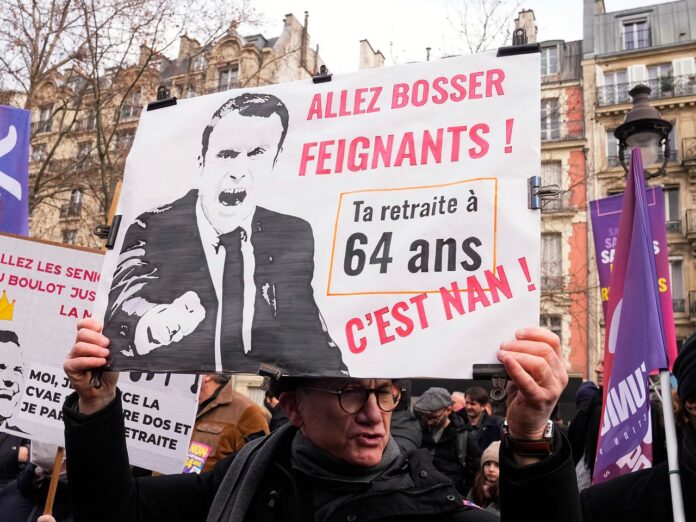Paris: Since 19 January 2023, France has seen a general strike and accompanying demonstrations, in protest of the government’s proposed pension reforms. The reforms would raise the standard retirement age from 62 to 64 years. The proposal has generated a great deal of anger and opposition from the working class of France from across the country.
Since it started lakhs of people have taken part in the demonstration in different parts of France. These demonstrations have been organized by a coalition of trade unions, including eight of the largest groups, and are supported by the majority of people in France, despite the inconveniences caused by the strike. The unions have vowed to continue the strikes and protests in a bid to persuade the government to abandon the reforms.
The protests have been mostly peaceful, though there have been some reports of clashes between police and a small number of protesters. Despite the large turnout, Macron has remained determined in his plans to go ahead with the pension reforms.
The demonstrations are ongoing with millions of people taking part in protests across the country, causing widespread disruption to transport, schools, and public services. The General Confederation of Labour (CGT), one of the largest trade union confederation has estimated that 28 lakh people have taken part in the protests.

Thousands of Medical Workers hold Protests in Paris
Rise of Protests over Macron
The international media has seen protests against the Macron government as a sign of its fragility. However, the reason people have been protesting the Macron government is more complicated. Since the 1990s, French leaders have tried to dismantle the welfare system of France in face of public opposition.
Since the November 2015 Paris terrorist attacks, the French government has effectively held a state of undeclared emergency in France. In the years following the attacks, labour protests and other forms of dissent were severely repressed. When Emmanuel Macron became President, he lifted these measures, but his policies as a neoliberal politician remained a source of contention. Trade unions have consistently organized protests against Macron’s administration. Even right-wing groups have taken advantage of the political unrest.

Macron taking on Pensions
In 2019, Macron proposed a pension system reform that would simplify the retirement scheme and raise the retirement age. He claimed that the current system was unsustainable and that more French citizens needed to work. He has said that if reforms are not implemented soon, then the pension system would be in danger. There does not appear to be any basis for this. According to government-run studies, the pension system in France produces a surplus as workers pay into the system. This proposal was met with opposition from trade unions, who organized widespread strikes.
In a scandal, the High Commissioner for Pension Reforms, Jean-Paul Delevoye, was found to have ties with the French Federation of Insurances, which is a conflict of interest and is illegal in France. Most French people supported the strikes, which were called by trade unions.
The 2019 protests were partially successful. Macron announced that he would delay presenting the new plan until January 2023. Part of the reason for this was the COVID Pandemic. This year, trade unions called for a general strike, which has led to the current situation.
The strikes have had a significant impact on the country, with transportation and other essential services disrupted. Despite Macron’s efforts to reform the pension system, many French citizens remain dissatisfied with the proposed changes and continue to call for a more equitable solution.
The protests against Macron’s administration reflect a wider trend of political unrest in France and across Europe. As governments grapple with economic and social challenges, citizens are increasingly taking to the streets to voice their concerns and demand change.
Origins of the Pension issue:
In 1983, the Socialist-led Mitterrand government reduced the retirement age from 65 to 60. However, in 1995, the right-wing Chirac government sought to usher in neoliberal policies, which included scrapping several welfare programs and reforming the retirement program. This sparked the largest general strike in France in over 25 years, which lasted from May to December 1995. The protests led to the closure of essential public services, such as transportation, but were still popular, with many organizations in France tracing their origins back to this strike.

Fifteen years later, in 2010, the Sarkozy government proposed raising the retirement age, which was met with massive strikes and demonstrations in September and October of that year. This proposal had been suggested as early as 2007, but it was not until three years later that it was met with widespread opposition. Many compared the 2010 protests to those in 1995, as they both revolved around proposed changes to the pension system.
Again in 2017, President Emmanuel Macron argued that the current program is unsustainable, and more people need to work to ensure its viability. However, protesters have pointed to growing economic inequality and proposed higher taxes on the rich to fund the program.
Why not tax the rich?
The French government is not the only one to have tried cutting welfare schemes in the name of reducing the deficit. In many countries, inequality has continued to increase, while the wealth of the rich remains protected. This has led to growing tensions between the working class and the wealthy elite, causing strife around the world.
One potential solution to this problem could be to use the wealth amassed by large businesses for social welfare programs. For example, even in India, where economic inequality is high, the profits of large corporations could go towards funding such programs. This would help ensure that the burden of paying for social welfare programs does not fall solely on the working class.
The debate over pension reform in France is just one example of a larger global issue: the growing inequality between the rich and the poor. By finding ways to distribute wealth more equitably and ensuring that everyone pays their fair share, governments can help alleviate the strain on social welfare programs and create a more just and sustainable society.
Author is a mathematician and political observer based in Bangalore. Views are personal.




























[…] Read Also: Popular Pushback Against Pension Proposal rocks France […]